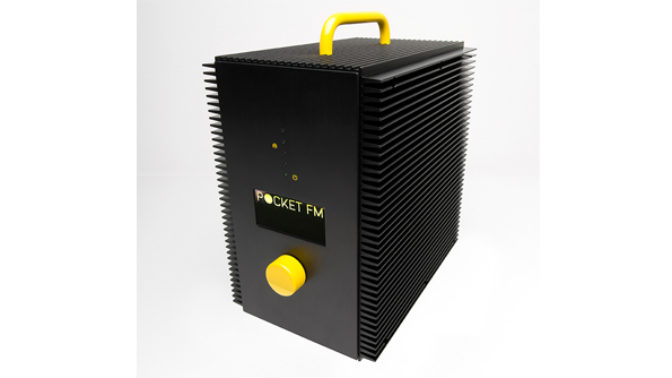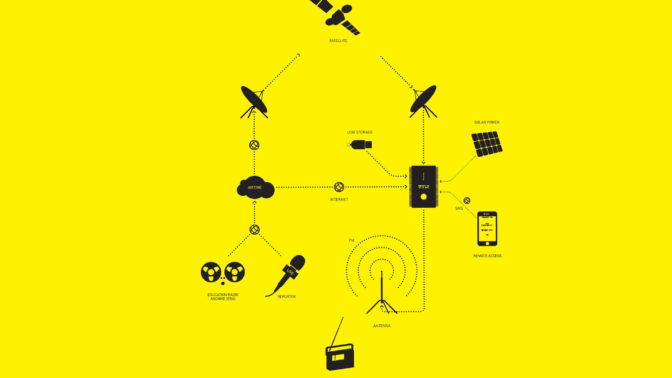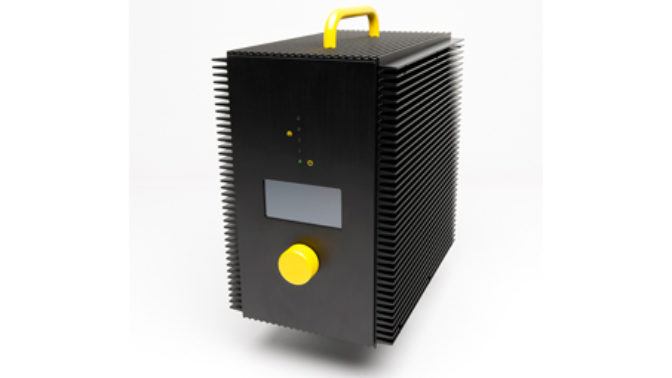Pocket FM
Pocket FM can be remote controlled via SMS or Wifi with its location being determined through GPS.
Key Facts
- Many people worldwide live in remote areas without internet access meaning they are frequently cut off from vital knowledge.
- Pocket FM enables people at the ‘base of the pyramid’ to improve their living conditions by providing crucial and timely information in acute crisis situations.
- Pocket FM is a broadcasting system, which serves as an interface between internet and radio.
- The portable transmitter has a broadcast range of 8 km and can be remote-controlled by SMS or the internet.
- Details on, for example, where food or water can be obtained in a conflict or post-conflict situation, can be transmitted.

Key Features
Pocket FM is a broadcasting system, which serves as an interface between internet and radio. The device has been adapted to situations and regions where communication is difficult, especially for those cut off from vital information including refugee camps and areas with civil wars.
The device has a robust FM transmitter based on a Raspberry Pi computer and a circuit board at the heart of its technology. Software has been specifically written to run on this Raspberry Pi and been combined with various digital features to allow for remote controlling of the device via SMS or WiFi, as well as determining the precise location of each device through GPS. This offers a completely new way of transferring essential information by receiving cloud-based radio programs via a satellite connection and then re-transmitting them using FM waves. In this way, an almost unlimited range of programs can be broadcasted in difficult-to-reach, poorly connected regions or emergency situations worldwide. The portable transmitter has a broadcast range of 8 km and can be remote-controlled by SMS or the internet. Powered by a small solar panel, the solution requires almost no maintenance and can run practically without interruption.
Pocket FM is equipped with a built-in satellite receiver so it can be fed with internet-delivered content or download content to broadcast over-the-air.
Social Impact
According to the World Bank, the so-called ‘base of the pyramid’ is estimated to include 4 billion people, or over half of the world’s population. Many of these people live in remote areas without internet access meaning they are frequently cut off from vital knowledge. What is more, they are also deprived of educational opportunities, and around 400 million often suffer from insufficient healthcare, lack of freedom of expression, and lack of access to education.
Pocket FM can bridge the last-mile information gap and reach these people fast and at low costs. This solution can also benefit those in post-disaster situations, war regions, or refugee camps. According to UNHCR, around 60 million people are currently refugees or internally-displaced persons. Pocket FM enables people at the ‘base of the pyramid’ to improve their living conditions by providing crucial and timely information in acute crisis situations. Details on, for example, where food or water can be obtained in a conflict or post-conflict situation, or which roads are safe to pass on a given day, can be transmitted. For those living in refugee camps, radio is a good way of learning about events and news in the camp. They can also keep in touch with their home regions when Pocket FM broadcast time is made available to radio stations from these areas. Farmers in remote rural areas can broaden their skill sets through educational radio programs and improve food security by getting more out of their land and crops. As widespread internet connectivity is still years away and will also remain too expensive for many, Pocket FM’s combination of online content and FM transmission can close a significant information gap.
The company, MiCT, implemented the “Ebola Bye Bye” FM radio project in Sierra Leone using Pocket FM. The project, which was carried out on behalf of the German Federal Foreign Office, aimed to provide information to those parts of the population that previously had little or no knowledge of the disease, and had little or no access to existing (media) campaigns and initiatives. Radio has played a central role in combatting Ebola in many regions of the country.
Currently, Pocket FM is also providing information to farmers in Burkina Faso.
Main Target Group
Local radio stations, local communities, international organizations.
Main User
Local radio stations, local communities, international organizations.

